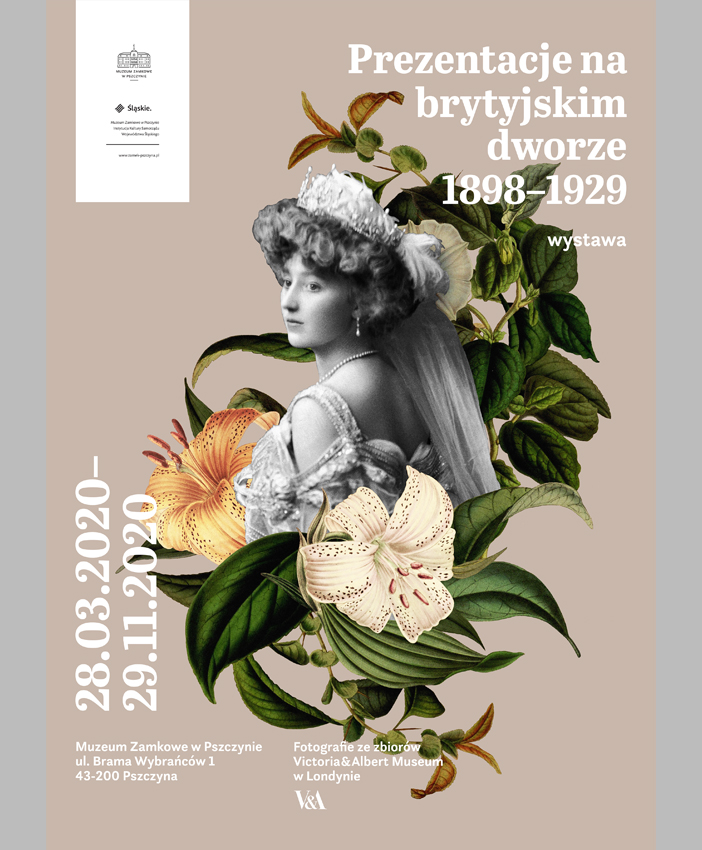
 |
Baroness von Graevenitz, née Marie Elizabeth Agnes (Maruscha) von Siemens (1860-1939) was the daughter of Karl Heinrich von Siemens (1820-1906), engineer and enterpreneur in the telegraph industry, and Marie Kap-her. In 1884 she married Baron George Alexandrovitch von Graevenitz, Councellor at the Russian Embassy in London.
For her attendance at the Court of 25 May, she wore the striking bare-shouldered gown of a lady-in-waiting of the Imperial Russian Court, with most probably the train of rich red velvet. In contrast to the ethereal look of British court gowns which celebrated the innocence of the débutantes, one sees here some basis in the adage that Russian court gowns are more like architecture than couture!
Crown Princess Marie of Romania, who attended the 1896 coronation of her cousin Tsar Nicholas II in Moscow, wrote that the “Byzantine splendour of this costume was exceedingly picturesque and was donned for all bigger occasions. It consisted of amply cut velvet robes over a tablier of white satin; the shape, with its train, and wide, long-hanging sleeves, had something medieval about it. These robes were heavily embroidered in silver or gold and were of every colour of the rainbow; the richest of all were of cloth of gold or silver. A halo-shaped kokoshnic with a veil hanging from beneath it inevitably accompanied this costume, so that every woman appeared to have been crowned.”
As well as her diamond and pearl kokoshnik headdress, Baroness von Graevenitz also wears a 10-string pearl choker, a two-string pearl necklace, diamond crescent corsage brooches and diamond bracelets.
During the Russian Revolution, the Baron and Baroness were in a railway station in Italy when they received the news that their estate at Gostilitzy, near Peterhof, had been stormed and all the servants murdered.

Biog:
m 1884 Baron George Alexandrovitch de Graevenitz
Date: 25 May
1900.
Occasion: The
Court (the Diplomatic Circle), 25 May 1900.
Location: The
Lafayette Studio, 179 New Bond St., London.
Descr: FL standing.
Costume: Russian
Court Dress:
"The Russian
court dress was exceedingly picturesque and was donned for all bigger
occasions. It consisted of amply cut velvet robes over a tablier
of white satin; the shape, with its train, and wide, long-hanging
sleeves, had something mediæval about it. These robes were
heavily embroidered in silver or gold and were of every colour of
the rainbow; the richest of all were of cloth of gold or silver.
A halo-shaped cocoshnic
with a veil hanging from beneath it inevitably accompanied this
costume, so that every woman appeared to have been crowned. This
unity of attire made all Russian court gatherings uniquely picturesque,
saturating them with colour and brilliance unlike anything else;
veritable pictures out of the "Thousand and One Nights,"
Byzantine in splendour, with all the mysterious gorgeousness of
the East. In those days the processional entry of the Russian Imperial
family into festive hall or saint-haunted church was a picture once
seen never to be forgotten." Marie, Queen of Roumania, The
Story of My Life, London, 1934, Vol I, p 95
Costume Supplier:
-
Jewellery: -
Furniture & Props:
Painted backdrop; painted column; studio chair and footstool.

| |
|
| Baron
Graevenitz 1900 |
| |
|
| |
|
| Baroness
Graevenitz 1900 |
Photographer:
Lafayette, 179 New Bond Street, London.
Evidence of photographer
at work: -
No of poses:
2.
Copyright: V&A
All
images on this site are copyright V&A. For further information
on using or requesting copies of any images
please contact the V&A Picture Library: vaimages@vam.ac.uk
including the URL of the relevant page
Provenance:
Pinewood Studios; acquired 1989.

References:
Biog: Marquis
of Ruvigny, The Titled Nobility of Europe, London, 1914.
Occasion: The
Times, 26 May 1900, p 10a.
Costume: -
Costume Supplier:
-
Jewellery: -
Reproduced: (version),
Madame, 9 June 1900, front page.

Additional Information:
-

|